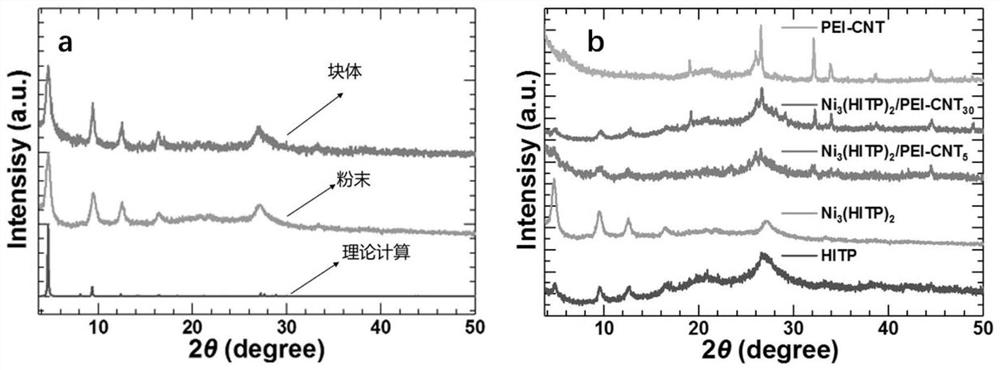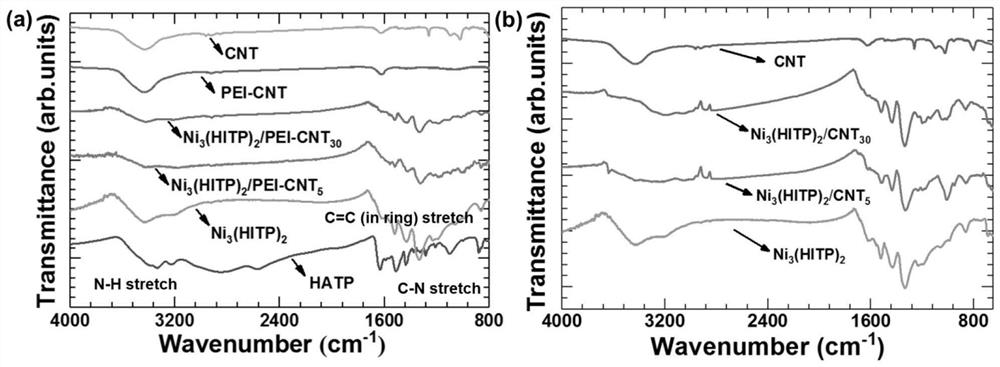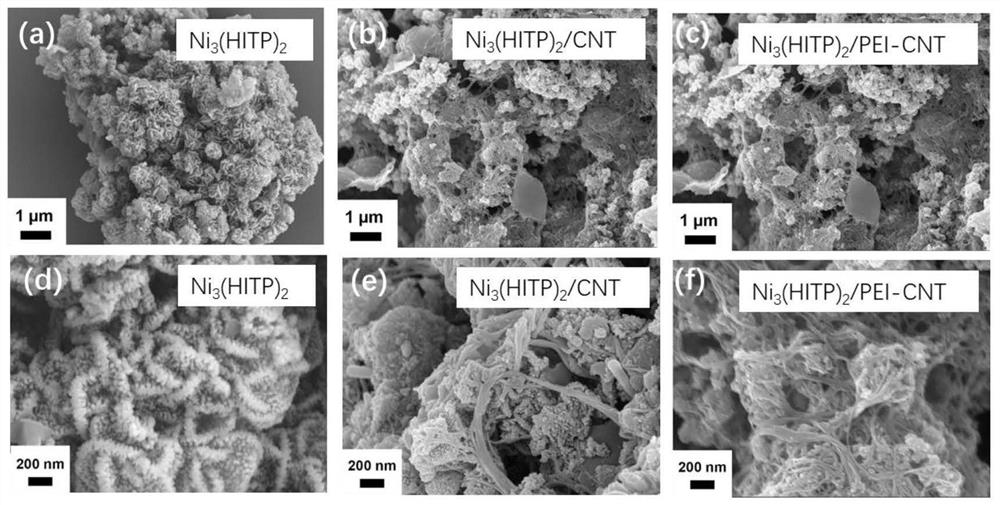A method for preparing a composite material based on a metal-organic framework and carbon nanotubes and a method for preparing a device
A technology of metal-organic framework and carbon nanotubes, which is applied in the manufacture/processing of thermoelectric devices, and the materials of thermoelectric device junction leads, etc., can solve the problems of reducing the thermoelectric properties of materials, and achieve the effect of potential application value
- Summary
- Abstract
- Description
- Claims
- Application Information
AI Technical Summary
Problems solved by technology
Method used
Image
Examples
preparation example Construction
[0056] The preparation process of the present invention is specifically as follows:
[0057] (1)Ni 3 (HITP) 2 Material preparation process:
[0058] 1.1 Disperse 141.9mg HATP·6HCl (0.267mmol) in 20-50mL deionized water, and record it as liquid A;
[0059] 1.2 Add 95.7mg NiCl 2 ·6H 2 O (0.4mmol) was dispersed in 20-50mL deionized water, and 2-6mL ammonia water was added (the mass concentration of ammonia water was 25%), which was recorded as liquid B;
[0060] 1.3 Place liquid A in an oil bath at 40-80°C, add liquid B to make it evenly mixed;
[0061] 1.4 Air bubbling for 25-60 minutes;
[0062] After 1.5, react at reflux under nitrogen protection for 1-4 hours;
[0063] 1.6 The solid obtained by the reaction is centrifuged and washed three times with ethanol, acetone and deionized water;
[0064] 1.7 Disperse the obtained powder in deionized water and reflux at 105°C for 20-40 hours (change the water once every 10-15 hours);
Embodiment 1
[0090] (1)Ni 3 (HITP) 2 Material preparation process:
[0091] 1.1) Disperse 141.9 mg of HATP·6HCl (0.267 mmol) in 30 ml of deionized water, and record it as liquid A;
[0092] 1.2) 95.7mg NiCl 2 ·6H 2 O (0.4 mmol) was dispersed in 30 milliliters of deionized water, and 3 milliliters of ammonia water was added (the mass concentration of ammonia water was 25%), which was recorded as liquid B;
[0093] 1.3) Place liquid A in a 65°C oil bath, add liquid B to mix evenly;
[0094] 1.4) Air bubbling for 45 minutes;
[0095] 1.5) then react for 2 hours under nitrogen protection reflux;
[0096] 1.6) The solid obtained by the reaction is centrifuged and washed three times with ethanol, acetone and deionized water;
[0097] 1.7) Disperse the obtained powder in deionized water, and reflux at 105°C for 36 hours (change the water every 12 hours);
[0098] 1.8) Then reflux with acetone at 65°C for 3 hours;
[0099] 1.9) The powder sample obtained by the reaction is repeatedly wash...
Embodiment 2
[0128] Ni 3 (HITP) 2 Preparation of materials:
[0129] 1.1) Disperse 0.267mmol HATP·6HCl in deionized water to obtain liquid A; wherein, the ratio of HATP·6HCl to deionized water is 0.267mmol: 20mL;
[0130] 0.4mmol NiCl 2 ·6H 2 O is dispersed in deionized water, and ammonia water is added to obtain liquid B; among them, NiCl 2 ·6H 2 O, the ratio of deionized water to ammonia water is 0.4mmol: 30mL: 2mL, and the mass concentration of ammonia water is 25%.
[0131] 1.2) Heat liquid A to 40°C, then add liquid B, and mix evenly; air bubbles for 25 minutes, and then reflux reaction under nitrogen protection for 4 hours to obtain a solid, which is post-treated to obtain Ni 3 (HITP) 2 Material.
[0132] N-type Ni 3 (HITP) 2 Preparation of / CNT composites:
[0133] (1) Carbon nanotubes (10mg) are mixed with sodium dodecylbenzenesulfonate, then added to the solvent, ultrasonically treated to obtain a carbon nanotube dispersion, and an N-type dopant is added to the carbon n...
PUM
 Login to View More
Login to View More Abstract
Description
Claims
Application Information
 Login to View More
Login to View More - R&D
- Intellectual Property
- Life Sciences
- Materials
- Tech Scout
- Unparalleled Data Quality
- Higher Quality Content
- 60% Fewer Hallucinations
Browse by: Latest US Patents, China's latest patents, Technical Efficacy Thesaurus, Application Domain, Technology Topic, Popular Technical Reports.
© 2025 PatSnap. All rights reserved.Legal|Privacy policy|Modern Slavery Act Transparency Statement|Sitemap|About US| Contact US: help@patsnap.com



